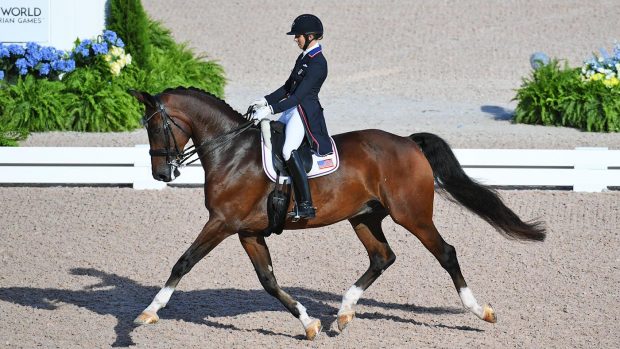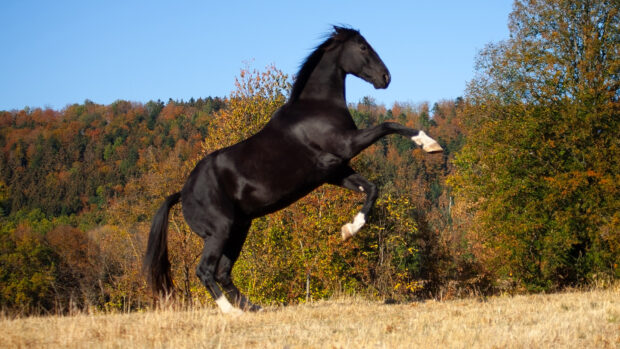An expert in equine thermoregulation is attempting to bust some of the myths spread about cooling horses.
Although most people seem to agree that water is key in reducing temperature, many still say, incorrectly, that the water must be scraped off – and many often insist that leaving a horse wet can make it hotter.
David Marlin, who conducted groundbreaking research into the subject with the FEI before the 1996 Atlanta Olympics and has since worked extensively in the area, has been trying to get the correct message out.
“Wild horses sweat, and go in lakes and rivers, and get soaked in thunderstorms in hot countries and there’s no one going round with a scraper – and they survive,” he told H&H.
“This shows it’s perfectly fine for a wet horse to be out in direct sunlight and it’s not going to ‘boil’ or even get hotter – just like we don’t if we get out of a swimming pool on a hot day. But there are people who don’t get it. It seems they’re invested for some reason in scraping being a really important thing to do.”
Dr Marlin explained that there are two principles at work when cooling horses with water.
One is the conductive transfer of heat. When there are two “bodies” in direct contact, in this case the horse and the water, heat will pass from the hotter body to the cooler until they are the same temperature.
So cold water put on a horse will get warmer – which may explain why people think it is heating the horse up – but it is because the horse is losing heat to the water.
“The heat moves from the horse into the water because there’s a temperature difference, and the bigger the difference, the faster the heat moves,” Dr Marlin said.
“So if the horse’s temperature is 40°C, you will cool it by putting on water at 35°C but not as fast as if you used water at 10 or 20°C.”
Dr Marlin said another “strange idea” put forward by some is that cold water can constrict blood vessels in the skin, causing it to heat up more, but that studies have shown this is not the case, and for the reasons explained above, colder water will remove heat faster.
“But what people seem obsessed with is this small amount of water in the coat,” he said. “Even with a thin layer, heat will still move from the horse to the water. I think because the water gets warm, people think it’s an insulator but it isn’t.
“Water is a better conductor of heat than air. That’s why, in winter, we scrape or dry sweaty horses; the last thing you want is to leave them wet as then they’ll get cold.”
Dr Marlin said the other method by which water cools horses is evaporation. The evaporation of water uses up energy and cools the surface on which the water sits. This is efficient (there is a lot of cooling for a little water), and means a wet horse will stay cooler than a dry one, but evaporative cooling is much slower than conductive transfer.
And while scraping water off will do no harm to a warm horse, if the horse is dangerously hot, it can slow the cooling process.
“For a very hot horse, continuous application of cold water is what could stop it collapsing and potentially suffering an injury or multiple organ failure and death,” Dr Marlin said.
“In cases of severe hyperthermia, it’s about how fast you can bring the temperature down, whether its people, horses or dogs.
“If you stop the application of water to scrape, you’re wasting time.”
Dr Marlin has also seen people recommending only applying the water or ice in certain areas, such as on large blood vessels to cool the blood, but he stressed that the important thing is applying the water all over the body for maximum cooling effect.
“Continuous application of cold water, all over, is what’s likely to save a life in that situation,” he said. “Heat stroke is one of the nastiest things that can happen to you.”
Dr Marlin also said allowing horses to drink before exercise and “as much as they want, immediately afterwards” is good practice.
Giving ice-cold water to horses to drink does no harm, contrary to popular belief, although it has been shown that horses will drink more if the water is at 20-25°C rather than 10, or 30°C.
You may also be interested in…

8 essential tips to help keep your horse cool when temperatures soar

9 tips for travelling in the heat with your horse
When temperatures soar, knowing how to keep dehydration at bay when your horse is on the move is more important

Subscribe to Horse & Hound magazine today – and enjoy unlimited website access all year round
For all the latest news analysis, competition reports, interviews, features and much more, don’t miss Horse & Hound magazine, on sale every Thursday.




